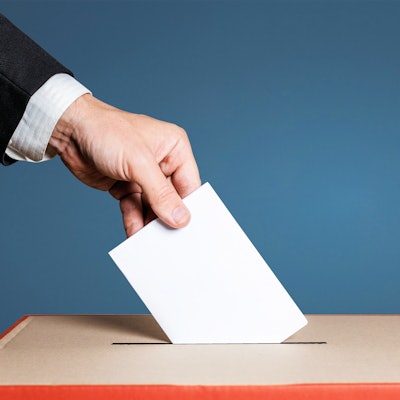
In this series hosted by Dr. Michael W. Davis, two prominent leaders in the dental profession answer the same questions. Neither participating dentist has advance knowledge of their counterpart, nor their answers. The answers are designed to generate discussion that ultimately benefits dentistry. Readers are invited to join the discussion by sharing their comments in the forum or sharing their thoughts on social media.
Today's debate: Medical loss ratios (MLRs) for dental plans
Participating experts: Michael Adelberg from the National Association of Dental Plans (NADP) and Dr. Mouhab Rizkallah of Massachusetts Question 2
Question No. 1: Will the recent passage of Massachusetts Question 2 and reportable MLRs have an impact nationally?
Michael Adelberg
 Michael Adelberg.
Michael Adelberg.Potentially. Before the Massachusetts ballot initiative, other states, including Maine (2021) and California (2014), looked at imposing loss ratios on dental plans and decided that the risks of doing so, given the low margin of dental plans and the potential ill effects for consumers, were too great. This prompted the states to only collect loss ratio information for the time being. Given the results of the Massachusetts ballot initiative, there could be increased activity on the issue in other states.
Dr. Mouhab Rizkallah
I refer to Question 2 as the "Boston Teeth Party" because much like the 1773 Boston Tea Party, Question 2 sparked a national revolution. Question 2 has made Massachusetts the first state to impose a dental insurance minimum spending requirement (83% of premium revenue) and the most robust revenue/expense reporting requirement in the history of the nation.
It is important for readers to recognize the unusual power of a ballot law compared to a traditional legislative law. Lobbyists opposing a legislative bill will often weaken the bill with loopholes so that even if it becomes law, it has a limited impact.
To write Question 2, I hired two law firms to perfect the law with me. My dental insurance ballot language was never even seen by lobbyists before I filed it. Now that it has passed, Question 2 is the worst nightmare of the unfair dental insurance industry, because a non-weakened ballot law standard is now the template standard for the entire nation -- think about that!
 Dr. Mouhab Rizkallah, MSD.
Dr. Mouhab Rizkallah, MSD.In Massachusetts, the largest dental insurer is Delta Dental of Massachusetts, which claims to be a not-for-profit company, but ProPublica records show that in 2019, the company contributed $291 million to its parent company while only providing $177 million to patient care that same year. In 2018, Delta Dental of Massachusetts provided $335 million to its parent company versus $184 million to patients.
This type of egregious waste will now stop in Massachusetts. I designed the mandatory revenue/expense reporting to identify and gradually root out waste, which will increase the patient spending percentage within just a few years. I expect the percentage to rise to at least 88% in Massachusetts.
To really convey the impact of Question 2's revenue/expense reporting, I should point out that the Committee to Protect Access to Quality Care and the Dental Service of Massachusetts (dba Delta Dental of Massachusetts) sued Question 2 at the Massachusetts Supreme Judicial Court (SJC) arguing that the reporting requirement was excessive. The seven justices of the SJC, however, sided with the ballot, indicating that the robust reporting, though quite burdensome, was integral to enforcing the intent of this powerful consumer protection law. The NADP knows this robust transparency will show egregious waste and help every state to pass this critical consumer protection law for dentistry.
Question No. 2: Will that impact be positive or negative? Please elucidate.
Michael Adelberg
Before examining the adverse effects of imposing an 83% dental MLR, it is important to remember the positive impacts of dental benefits:
- Consumers receive dental care at a tremendous cost savings.
- Historically, dental benefits have a persistently low premium trend.
- Consumers with dental coverage are nearly two times more likely to see their dentists than consumers without coverage, according to the NADP Consumer Survey.
NADP believes mandated minimum MLRs will negatively impact consumers. Mandated minimum MLRs were created for medical plans, which differ from dental plans, both in cost and approach to health issues.
In 2021, the average monthly dental premium in Massachusetts was $37. At an 83% MLR, dental plans would have a little more than $6 per member per month to administer benefits. The national average dental plan premium for all commercial products was $29.63 per member per month, according to the "NADP Dental Benefits Report: Premium 2021." Conversely, average national medical premiums covering a single individual are $645 a month, according to the Kaiser Family Foundation.
In addition, medical plans cover thousands of conditions and diseases, while dental covers mainly two: gum disease and caries. Dental plans also typically cover 100% of preventive care and apply copayments, either as a dollar amount (DHMOs) or as a percentage (DPPOs and dental indemnity or traditional insurance) to other levels of care. This is a key difference in dental plan design compared to medical coverage.
Meanwhile, dental plans have many of the same administrative burdens as medical carriers, such as call centers, customer service, and claims processing. Because the denominator in a dental MLR calculation is so low, it would not be feasible for many dental plans to administer benefits effectively with an MLR of 83%. According to the Milliman Report, which was commissioned by NADP, consumers may experience higher plan premiums and a smaller selection of dental plans.
The 83% MLR could force reductions in dental plan services. As discussed in greater detail below, NADP believes consumers may see reductions in customer service, a reduction in consumer protections, and possibly loss of access to their current dentist.
NADP believes a dental MLR will have the following negative impacts:
- Possible loss of consumer protections: Dental plans perform claims review on many covered procedures for consumer protection against fraud, waste, and abuse.
- Reduced options for coverage: The Milliman Report indicates that many dental plans will face losses under an 83% MLR. This could result in plans deciding to exit the state market.
- Possible loss of coverage: Consumers with individual or small group coverage may lose dental benefits, because the carriers providing these plans are the ones that would most likely exit the market.
- Diminished oral health: Lack of dental insurance is the No. 1 barrier to receiving dental care, according to the "NADP 2021 Consumer Tracking Study." Thus consumers without dental coverage are less likely to visit the dentist and receive the dental treatment they need.
- Reduced dental office visits: Consequently, if consumers are less likely to see the dentist, then dentists will see fewer patients, resulting in less income.
The Milliman Report also indicates possible dental MLR refunds in Massachusetts may fall below the $20 de minimis amount used for medical plans under the Patient Protection and Affordable Care Act. Many times, the cost to calculate and distribute the refunds would be greater than the refund amount.
From the NADP's point of view, consumers gain nothing of real value from dental MLRs and will be exposed to greater risk. While this overview refers to the Milliman Report, the opinions expressed are NADP's alone.
Dr. Mouhab Rizkallah
Question 2 creates a powerful positive paradigm shift. Instead of the old paradigm of "make more by spending less," the new paradigm for insurance companies will be "make more by spending more on patient care."
In that way, Question 2 simply harnesses dental insurers' desire for more profit and uses it to do good. Massachusetts dental insurers now only get to keep 17% of premium revenue if and only if they spend 83% on patient care, or they must provide premiums refunds until that ratio is achieved.
Rest assured, dental insurers in any state that adopt my law will make sure that all 83% goes to patient care rather than refunds. This will take the form of increased maximums, lower copays, broader coverages, keeping up with inflation in fee schedules, allowing the assignment of benefits, and decreasing unfair utilization audits that claw back payments.
I anticipated that dental insurers will even try to increase premiums for patients in order to increase their 17% dollar figure. So I wrote into the law that the Massachusetts Division of Insurance must presumptively deny premium increases that are excessive, higher than the consumer price index for dental services, and are not demonstrably value-based. This was important to me, because by ensuring that true value exists for all dental insurance plans, more patients will buy dental insurance and use it in this state -- and in any state that adopts the Question 2 template.
For any state that adopts this law, patients will pay less and get more while dentists will make more by having fair fees and greater treatment plan acceptance. This is all achieved by redirecting egregious waste back to patient care and without increased premiums.
What a wonderful impact Question 2 will have when oral health (and overall health) across the nation improves by simply harnessing the desire of dental insurers to make more profit to incentivize fair dental insurance.
Michael Adelberg joined the NADP in November 2022 as executive director. He came to NADP after leading Faegre Drinker Consulting's healthcare provider and plans practice in Washington, DC, where his practice was largely focused on insurance benefits, including dental benefits. Adelberg has also held several senior positions within the U.S. Centers for Medicare and Medicaid Services and was responsible for establishing the Patient Protection and Affordable Care Act policy for pediatric dental coverage and standalone dental plans. He holds master's degrees in public policy and administration from Northern Illinois University and history from Rutgers University.
Dr. Mouhab Rizkallah, MSD, is the author and chairman of Massachusetts Question 2. He is an orthodontist and president of the Medicaid Orthodontists of Massachusetts Association. Rizkallah is a 2001 graduate of the Stony Brook School of Dental Medicine, where he was valedictorian and president of his class throughout dental school. Rizkallah received his orthodontics certificate in 2004 from Boston University.
The comments and observations expressed herein do not necessarily reflect the opinions of DrBicuspid.com, nor should they be construed as an endorsement or admonishment of any particular idea, vendor, or organization.



















